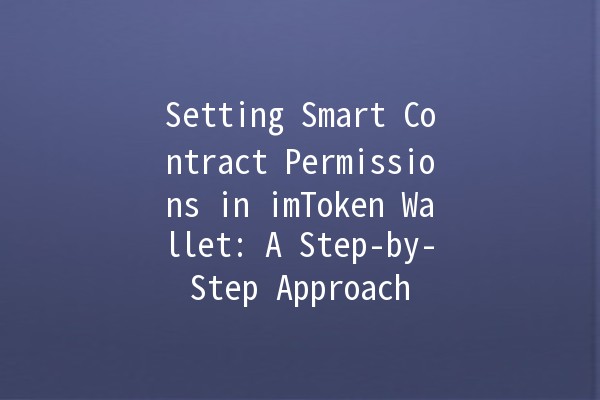Smart contracts are selfexecuting contracts with the terms of the agreement directly written into code. They run on blockchain technology and are often used to automate processes, manage agreements, and facilitate transactions without intermediaries. imToken wallet is a popular digital wallet that supports various cryptocurrencies and enables users to interact with smart contracts seamlessly.
Setting permissions for your smart contracts is a crucial aspect of ensuring security and functionality. Permissions determine who has the authority to execute transactions, modify data, or access specific functionalities within a contract. By carefully managing these permissions, users can protect their assets and maintain control over their smart contracts.
Utilizing a multisignature wallet allows multiple parties to approve transactions, adding an extra layer of security to your smart contracts. This approach minimizes the risk of unauthorized access or malicious activities. For example, you can set up a contract that requires signatures from three out of five designated individuals to execute a critical function.
RoleBased Access Control (RBAC) is a security paradigm that restricts system access based on the roles of individual users within an organization. When setting up your smart contract in imToken, define specific roles (e.g., admin, editor, viewer) and assign permissions accordingly. This structure helps streamline operations and ensures only authorized users can perform sensitive actions.

Conducting regular audits of your smart contract permissions is vital for maintaining security and identifying vulnerabilities. Use tools like Etherscan or those integrated within the imToken wallet to review the access logs and permissions set on your smart contracts. By identifying unusual activities or potential security risks, you can react swiftly to mitigate threats.
Timelocked contracts are a type of smart contract that restricts certain functions for a specified duration. By implementing timelocks, you can prevent immediate execution of sensitive changes, allowing time for these changes to be reviewed by other stakeholders before going live. This technique helps in avoiding hasty decisions and potential security breaches.
Training and educating your team on the importance of smart contract permissions is essential. Ensure that all members understand the implications of their actions regarding access and permissions. Host workshops or distribute guides to clarify best practices for managing smart contracts, emphasizing the risks of improper handling.
If a private key is compromised, anyone with access to it can execute transactions, which could lead to unauthorized actions like fund transfers. Always use secure storage solutions for your private keys and consider multisignature wallets for enhanced protection.
Changing permissions after deployment can be complex and may require a new contract deployment depending on how the contract is structured. Ensure that your initial contract design allows for flexibility in permissions, or consider integrating an upgradeable contract framework.
If your contract is locked due to improper permissions, recovery options may depend on the contract's design. Engage with a developer who can assess your specific situation and possibly create transactions to restore access.
Several tools are available for auditing smart contracts, including MythX, Slither, and Etherscan. These tools can help identify vulnerabilities and confirm that permissions are correctly set.
Neglecting permissions can lead to unauthorized access, exploitation of contract functions, and potential loss of funds. Always ensure that your smart contract code includes comprehensive permission settings.
Blockchain technology provides a decentralized and immutable ledger, making it challenging to tamper with set permissions. Every transaction is recorded, which increases transparency and allows for easy auditing.
Setting smart contract permissions in imToken wallet is essential for managing security and operational efficiency. Implementing techniques such as multisignature wallets, RBAC, and regular audits can significantly enhance the safety of your assets. By adhering to best practices and continuously educating your team, you can navigate the complexities of smart contract management with confidence.